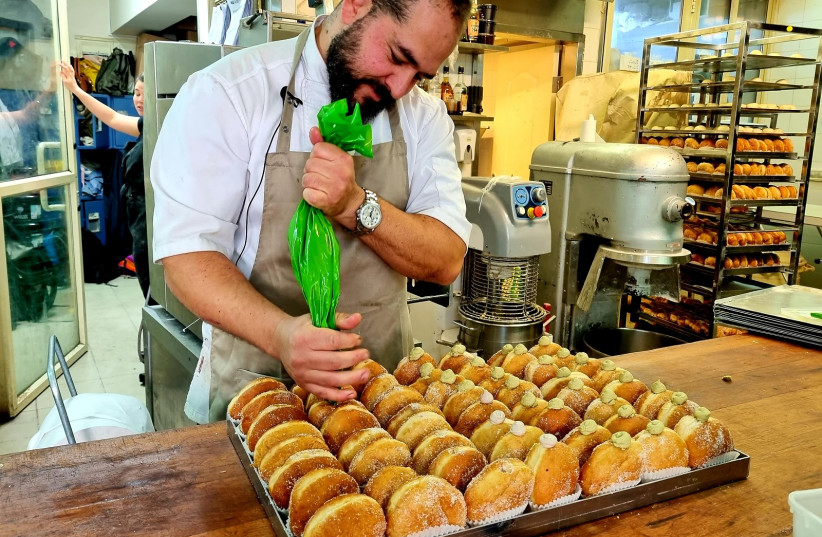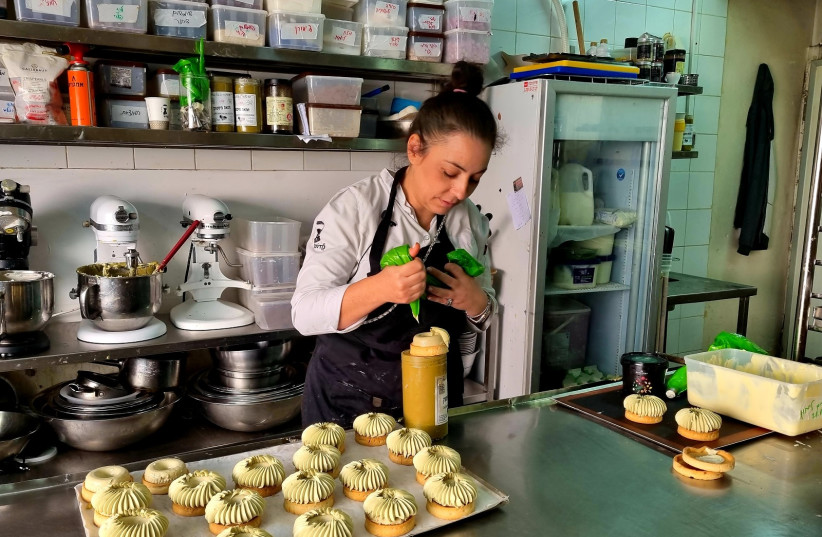Every year during the Jewish holiday of Hanukkah, customers make a pilgrimage to Café Kadosh in Jerusalem.
For more stories from The Media Line go to themedialine.org
Undoubtedly one of Israel’s most popular bakeries, Café Kadosh comes out with unique new iterations of a beloved holiday treat each year: the sufganiyah.
A round donut that is typically filled with jam, pastry cream or custard, the sufganiyah is eaten by Jews the world over eat during Hanukkah to celebrate the miracle of the oil in the Holy Temple in Jerusalem more than 2,000 years ago.
At Kadosh, the deep-fried treat draws throngs of people, who line up outside the tiny bakery for a chance to buy some.
This year’s special creation is inspired by the flavors of Jerusalem’s Old City.
“This year we created a donut that we call the ‘Old City’ sufganiyah,” Itzik Kadosh, co-owner of Café Kadosh, told The Media Line. “The Jerusalem-inspired pastry cream is made out of halva [a sweet sesame dessert] and is combined with pistachio. We mixed them all together and it’s delicious.”

Also known as the Festival of Lights, Hanukkah is an eight-day Jewish holiday that begins on Sunday night. Aside from feasting on fried goodies, people also light candles, give presents and spin a top, known as the dreidel.
Israelis from around the country are expected to buy tens of millions of donuts over the coming weeks. In fact, Café Kadosh alone sells thousands of sufganiyot [plural of sufganiyah] each day during the weeklong holiday.
“We make everything we serve here from A to Z,” he said. “We make all the dough, cream fillings and confections from scratch. We don’t serve anything that was prepared elsewhere. It’s a Sisyphean task.”
Whether pineapple, raspberry, pecan-caramel, chestnut or pistachio cream – the donuts at Kadosh come in a surprising range of flavors. One of the goals, Itzik noted, is to move away from the traditional jelly-filled variety and create something that appeals to the shifting tastes of the time.
“The younger generation wants something different,” Itzik said. “It has to be Instagram-worthy, it has to look good and it has to be tasty. Our donuts stack up.”
When the COVID-19 pandemic was in full swing last year and the threat of a nationwide lockdown was looming, the bakery decided to publish a book with all of its most cherished recipes in order to allow people to prepare their very own sufganiyot while they were stuck at home. Though it is currently only available in Hebrew, Itzik is hoping to have the book translated into both English and Arabic soon.
Unlike traditional jelly-filled donuts, which are generally based on East European cuisine, Kadosh’s offerings are inspired by the Moroccan-style sfenj donut, as well as French and Italian pastries.

This blend of culinary influences is what ultimately makes Israeli cuisine so special, said Keren Kadosh, Itzik’s wife who is also a pastry chef and co-owns the bakery.
“In Jerusalem, there are so many people who came here from all over the world; in the same building, you can find people who immigrated here from Poland, Morocco, Kurdistan or Iraq,” Keren told The Media Line. “Food connects us as human beings everywhere we go in the world.”
“It doesn’t matter what your political beliefs are,” she continued. “At the end of the day when you sit down at a table to eat and drink – with all of those cultural influences – everyone is happy and everything else becomes less important.”
